英语高考的实词与虚词
- 格式:doc
- 大小:150.50 KB
- 文档页数:9
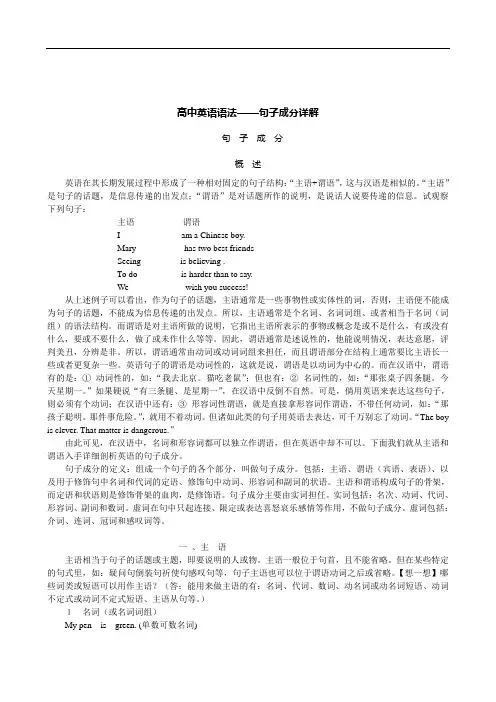
高中英语语法——句子成分详解句子成分概述英语在其长期发展过程中形成了一种相对固定的句子结构:“主语+谓语”,这与汉语是相似的。
“主语”是句子的话题,是信息传递的出发点;“谓语”是对话题所作的说明,是说话人说要传递的信息。
试观察下列句子:主语谓语I am a Chinese boy.Mary has two best friendsSeeing is believing .To do is harder than to say.We wish you success!从上述例子可以看出,作为句子的话题,主语通常是一些事物性或实体性的词,否则,主语便不能成为句子的话题,不能成为信息传递的出发点。
所以,主语通常是个名词、名词词组、或者相当于名词(词组)的语法结构。
而谓语是对主语所做的说明,它指出主语所表示的事物或概念是或不是什么,有或没有什么,要或不要什么,做了或未作什么等等。
因此,谓语通常是述说性的,他能说明情况,表达意愿,评判美丑,分辨是非。
所以,谓语通常由动词或动词词组来担任,而且谓语部分在结构上通常要比主语长一些或者更复杂一些。
英语句子的谓语是动词性的,这就是说,谓语是以动词为中心的。
而在汉语中,谓语有的是:①动词性的,如:“我去北京。
猫吃老鼠”;但也有:②名词性的,如:“那张桌子四条腿。
今天星期一。
”如果硬说“有三条腿、是星期一”,在汉语中反倒不自然。
可是,倘用英语来表达这些句子,则必须有个动词;在汉语中还有:③形容词性谓语,就是直接拿形容词作谓语,不带任何动词,如:“那孩子聪明。
那件事危险。
”,就用不着动词。
但诸如此类的句子用英语去表达,可千万别忘了动词。
“The boy is clever. That matter is dangerous.”由此可见,在汉语中,名词和形容词都可以独立作谓语,但在英语中却不可以。
下面我们就从主语和谓语入手详细剖析英语的句子成分。
句子成分的定义:组成一个句子的各个部分,叫做句子成分。
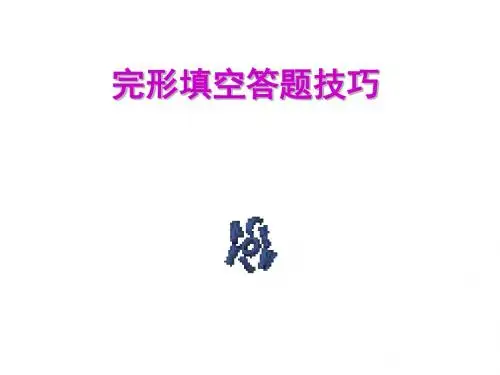
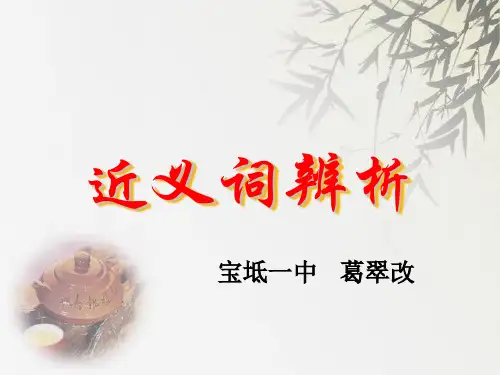
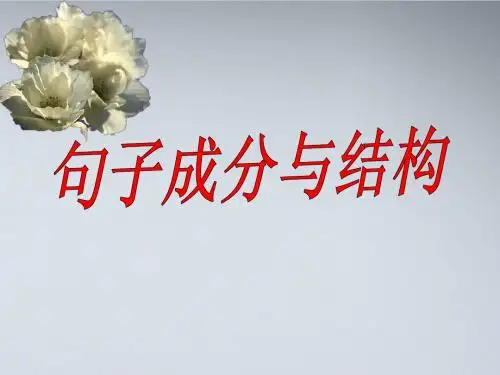
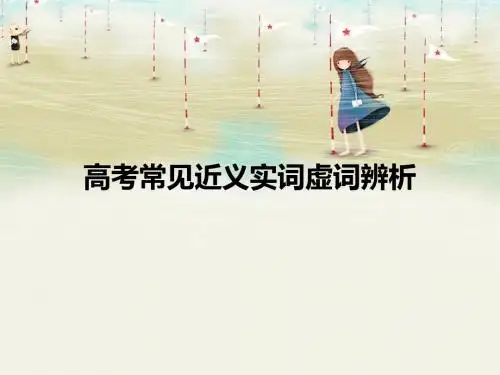
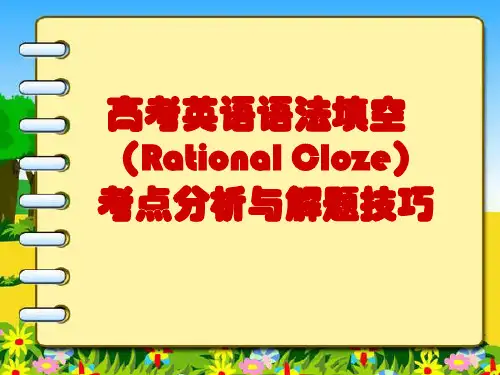
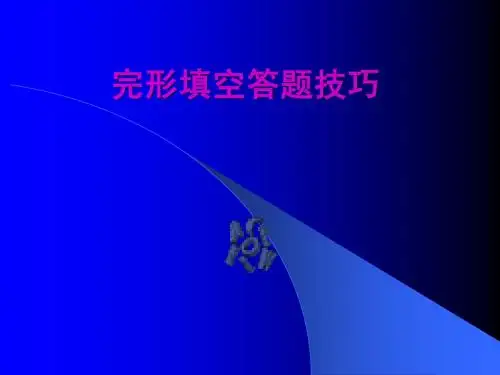
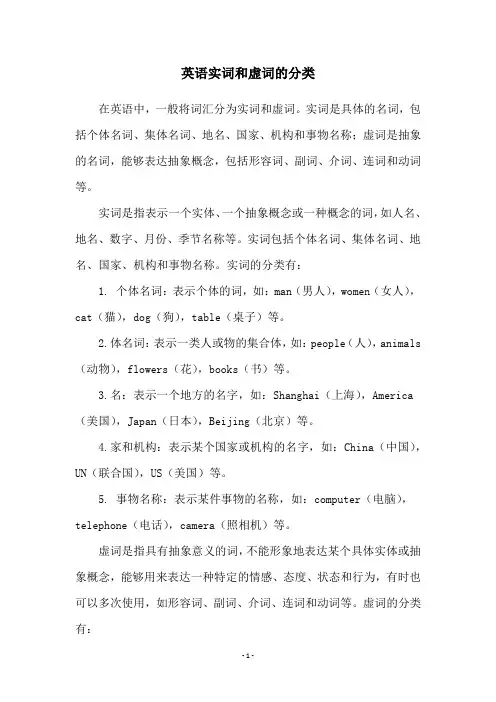
英语实词和虚词的分类在英语中,一般将词汇分为实词和虚词。
实词是具体的名词,包括个体名词、集体名词、地名、国家、机构和事物名称;虚词是抽象的名词,能够表达抽象概念,包括形容词、副词、介词、连词和动词等。
实词是指表示一个实体、一个抽象概念或一种概念的词,如人名、地名、数字、月份、季节名称等。
实词包括个体名词、集体名词、地名、国家、机构和事物名称。
实词的分类有:1. 个体名词:表示个体的词,如:man(男人),women(女人),cat(猫),dog(狗),table(桌子)等。
2.体名词:表示一类人或物的集合体,如:people(人),animals (动物),flowers(花),books(书)等。
3.名:表示一个地方的名字,如:Shanghai(上海),America (美国),Japan(日本),Beijing(北京)等。
4.家和机构:表示某个国家或机构的名字,如:China(中国),UN(联合国),US(美国)等。
5. 事物名称:表示某件事物的名称,如:computer(电脑),telephone(电话),camera(照相机)等。
虚词是指具有抽象意义的词,不能形象地表达某个具体实体或抽象概念,能够用来表达一种特定的情感、态度、状态和行为,有时也可以多次使用,如形容词、副词、介词、连词和动词等。
虚词的分类有:1.容词:表示一个实体的性质和特征,如:pretty(漂亮的),large(大的),happy(快乐的),old(旧的)等。
2.词:表示动作的程度、方式、状态、时间和地点,如:quickly (快地),sometimes(有时候),there(那里),always(总是)等。
3. 介词:表示介词短语的词,它们放在句子中表示方位、比较、时间或其他类型的关系。
如:in(在),from(从),about(关于),before(之前)等。
4.词:用于连接句子或词组,如:and(和),but(但是),because (因为),if(如果)等。
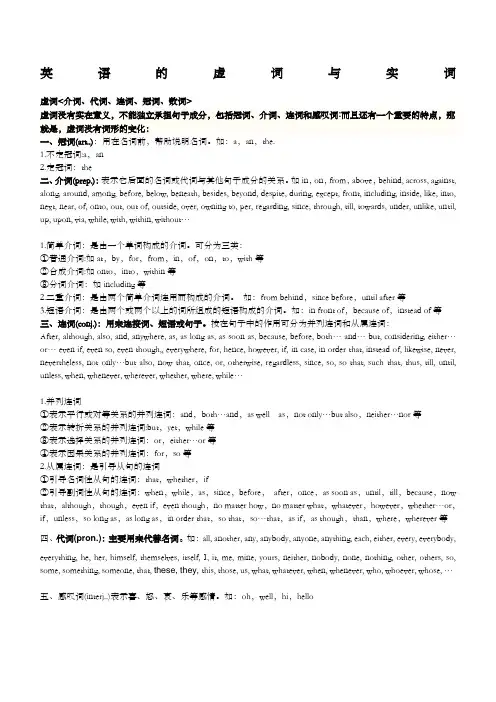
英语的虚词与实词虚词<介词、代词、连词、冠词、数词>虚词没有实在意义,不能独立承担句子成分,包括冠词、介词、连词和感叹词:而且还有一个重要的特点,那就是,虚词没有词形的变化:一、冠词(art..):用在名词前,帮助说明名词。
如:a,an,the.1.不定冠词:a,an2.定冠词:the二、介词(prep.):表示它后面的名词或代词与其他句子成分的关系。
如in,on,from,above,behind, across, against, along, around, among, before, below, beneath, besides, beyond, despite, during, except, front, including, inside, like, into, next, near, of, onto, out, out of, outside, over, owning to, per, regarding, since, through, till, towards, under, unlike, until, up, upon, via, while, with, within, without…1.简单介词:是由一个单词构成的介词。
可分为三类:①普通介词:如at,by,for,from,in,of,on,to,with等②合成介词:如onto,into,within等③分词介词:如including等2.二重介词:是由两个简单介词连用而构成的介词。
如:from behind,since before,until after等3.短语介词:是由两个或两个以上的词所组成的短语构成的介词。
如:in front of,because of,instead of等三、连词(conj.):用来连接词、短语或句子。
按在句子中的作用可分为并列连词和从属连词:After, although, also, and, anywhere, as, as long as, as soon as, because, before, both… and… but, considering, either…or… even if, even so, even though,, everywhere, for, hence, however, if, in case, in order that, instead of, likewise, never, nevertheless, not only…but also, now that, once, or, otherwise, regardless, since, so, so that, such that, thus, till, until, unless, when, whenever, wherever, whether, where, while…1.并列连词①表示平行或对等关系的并列连词:and,both…and,as well as,not only…but also,neither…nor等②表示转折关系的并列连词:but,yet,while等③表示选择关系的并列连词:or,either…or等④表示因果关系的并列连词:for,so等2.从属连词:是引导从句的连词①引导名词性从句的连词:that,whether,if②引导副词性从句的连词:when,while,as,since,before,after,once,as soon as,until,till,because,now that,although,though,even if,even though,no matter how,no matter what,whatever,however,whether…or,if,unless,so long as,as long as,in order that,so that,so…that,as if,as though,than,where,wherever等四、代词(pron.):主要用来代替名词。
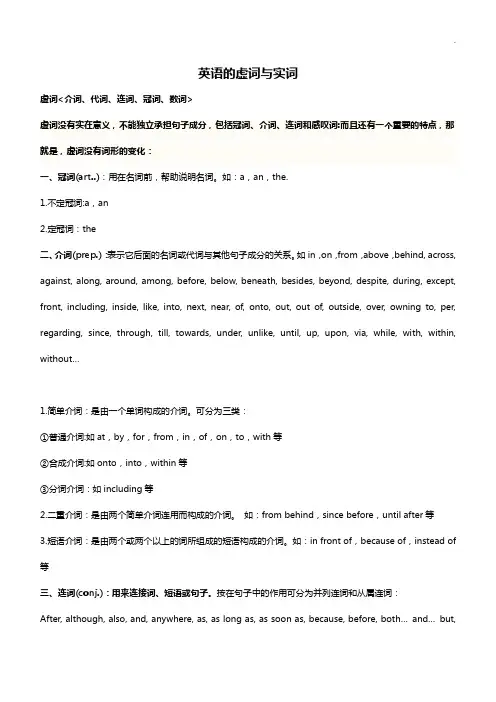
英语的虚词与实词虚词<介词、代词、连词、冠词、数词>虚词没有实在意义,不能独立承担句子成分,包括冠词、介词、连词和感叹词:而且还有一个重要的特点,那就是,虚词没有词形的变化:一、冠词(art..):用在名词前,帮助说明名词。
如:a,an,the.1.不定冠词:a,an2.定冠词:the二、介词(prep.):表示它后面的名词或代词与其他句子成分的关系。
如in,on,from,above,behind, across, against, along, around, among, before, below, beneath, besides, beyond, despite, during, except, front, including, inside, like, into, next, near, of, onto, out, out of, outside, over, owning to, per, regarding, since, through, till, towards, under, unlike, until, up, upon, via, while, with, within, without…1.简单介词:是由一个单词构成的介词。
可分为三类:①普通介词:如at,by,for,from,in,of,on,to,with等②合成介词:如onto,into,within等③分词介词:如including等2.二重介词:是由两个简单介词连用而构成的介词。
如:from behind,since before,until after等3.短语介词:是由两个或两个以上的词所组成的短语构成的介词。
如:in front of,because of,instead of 等三、连词(conj.):用来连接词、短语或句子。
按在句子中的作用可分为并列连词和从属连词:After, although, also, and, anywhere, as, as long as, as soon as, because, before, both…and…but,considering, either…or…even if, even so, even though,, everywhere, for, hence, however, if, in case, in order that, instead of, likewise, never, nevertheless, not only…but also, now that, once, or, otherwise, regardless, since, so, so that, such that, thus, till, until, unless, when, whenever, wherever, whether, where, while…1.并列连词①表示平行或对等关系的并列连词:and,both…and,as well as,not only…but also,neither…nor等②表示转折关系的并列连词:but,yet,while等③表示选择关系的并列连词:or,either…or等④表示因果关系的并列连词:for,so等2.从属连词:是引导从句的连词①引导名词性从句的连词:that,whether,if②引导副词性从句的连词:when,while,as,since,before,after,once,as soon as,until,till,because,now that,although,though,even if,even though,no matter how,no matter what,whatever,however,whether…or,if,unless,so long as,as long as,in order that,so that,so…that,as if,as though,than,where,wherever等四、代词(pron.):主要用来代替名词。
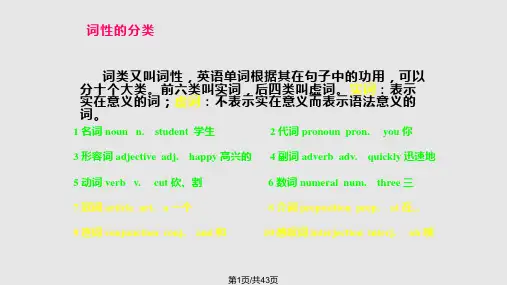
高中英语语法——句子成分详解(高考专用关于英语语法英语学习没有捷径,只有一步一个脚印!回顾我当初学习英语语法的历程,从初中、高中直到大学,语法一直以不同的形式见诸于各类考试的试题当中。
现在,尽管各类考试纷纷进行改革,取消或弱化对语法“显性”的考察,转而加强对语言运用能力的考察。
然而,对于语法“隐性”的考察却从来没有终止过,也不可能停止!比如,单项选择、完形填空、阅读(考察长句或复合句、写作,无一不需要坚实的语法知识作为基石。
因此,从某种程度上讲,对语法的考核实际上并未削弱。
把英语作为一门外语来学,对其语法的学习将是一项长期的任务。
一定要消除“任务”或“投机”心态。
俗话说,兴趣是最好的老师,语法学习是一个长期积累、不断提高的过程,在“任务”的心态之下,语法学习容易变成一种被迫的行为,很难持之以恒;而在“投机”的心态之下,语法学习容易变成一种短期行为,试图在短期内一蹴而就反而会遭遇“欲速则不达”的困境。
因此,在语法学习的过程中,要善于发掘或培养自身的兴趣,比如,不妨多看看适合自身水平的英语读物;听听英语歌曲,许多歌词本身就包含着某些语法规则;多写些英语句段等。
总的来说,语法的学习应遵循以下两个基本原则:第一、要记忆,但不要僵化语法到底是不是一种“规则”?本人认为,语法是规则,但又不完全是规则。
对于初学者而言,规则是要去遵守的,比如不同时态的构成形式,各类句式的构成要素等等,如果缺乏对规则的了解,面对零散的单词,是不可能建造起语言的大厦的。
这也是为什么很多人面对长难句束手无策,想要表达自己的观点却搜肠刮肚写不出来的原因之一。
从这个意义上说,语法是语言运用的规则。
第二、勤练习,能举一反三语言的掌握和运用,熟能生巧是关键。
正如“拳不离手,曲不离口”。
语法的规则和理论需要在实践中巩固、消化,乃至举一反三。
随着语法学习的深入和英语水平的不断提高,就会发现并不需要刻意去关注语法规则,这并不是说规则消失了,而是潜移默化成了一种思维模式,就像我们运用母语一样。
英语实词和虚词的分类
实际上,在英语语法中,词语可以大致分为两类:实词和虚词。
实词是指用来表示名词、形容词、动词等概念的单词,而虚词则是指不能表示概念的单词,也就是指语法上有用,但意义上没有用的词语,而虚词则是不具有概念表示能力的部分词语。
英语中的实词主要指名词、形容词、动词、数词和代词等词语,它们都能用来表示人的行为或某种事物的概念,比如“man”表示一个可以指称的人,而“good”表示一种质量,而“run”表示一种行为,这些词语都是实词。
实词有两大类:及物动词和不及物动词,及物动词可以与宾语一起使用,而不及物动词则不需要宾语。
英语中的虚词主要指介词、冠词、连词、助动词和感叹词等词语,它们在表达上只具有语法意义,而不具有概念表示能力,比如“at”表示位置,而“the”表示特定的意思,而“and”表示相连的意思,而“can”表示能力,而“oh”表示惊讶的意思,这些词语都是虚词。
虚词有三大类:介词、冠词和助词。
介词表示一种关系,冠词表示一些特殊意义,而助词则是用来连接句子中的多个部分,表示从句与主句之间的关系。
综上所述,英语中的实词和虚词可以分为多种不同的类别,它们都在语法中发挥着不同的作用,因此,要能够熟练使用英语,就需要掌握语法中实词和虚词的正确使用。
- 1 -。
英语的虚词与实词虚词<介词、代词、连词、冠词、数词>虚词没有实在意义,不能独立承担句子成分,包括冠词、介词、连词和感叹词:而且还有一个重要的特点,那就是,虚词没有词形的变化:一、冠词(art..):用在名词前,帮助说明名词。
如:a,an,the.1.不定冠词:a,an2.定冠词:the二、介词(prep.):表示它后面的名词或代词与其他句子成分的关系。
如in,on,from,above,behind, across, against, along, around, among, before, below, beneath, besides, beyond, despite, during, except, front, including, inside, like, into, next, near, of, onto, out, out of, outside, over, owning to, per, regarding, since, through, till, towards, under, unlike, until, up, upon, via, while, with, within, without…1.简单介词:是由一个单词构成的介词。
可分为三类:①普通介词:如at,by,for,from,in,of,on,to,with等②合成介词:如onto,into,within等③分词介词:如including等2.二重介词:是由两个简单介词连用而构成的介词。
如:from behind,since before,until after等3.短语介词:是由两个或两个以上的词所组成的短语构成的介词。
如:in front of,because of,instead of等三、连词(conj.):用来连接词、短语或句子。
按在句子中的作用可分为并列连词和从属连词:After, although, also, and, anywhere, as, as long as, as soon as, because, before, both…and…but, considering, either… or… even if, even so, even though,, everywhere, for, hence, however, if, in case, in order that, instead of, likewise, never, nevertheless, not only…but also, now that, once, or, otherwise, regardless, since, so, so that, such that, thus, till, until, unless, when, whenever, wherever, whether, where, while…1.并列连词①表示平行或对等关系的并列连词:and,both…and,as well as,not only…but also,neither…nor等②表示转折关系的并列连词:but,yet,while等③表示选择关系的并列连词:or,either…or等④表示因果关系的并列连词:for,so等2.从属连词:是引导从句的连词①引导名词性从句的连词:that,whether,if②引导副词性从句的连词:when,while,as,since,before,after,once,as soon as,until,till,because,now that,although,though,even if,even though,no matter how,no matter what,whatever,however,whether…or,if,unless,so long as,as long as,in order that,so that,so…that,as if,as though,than,where,wherever 等四、代词(pron.):主要用来代替名词。
英语的虚词与实词虚词<介词、代词、连词、冠词、数词>虚词没有实在意义,不能独立承担句子成分,包括冠词、介词、连词和感叹词:而且还有一个重要的特点,那就是,虚词没有词形的变化:一、冠词(art..):用在名词前,帮助说明名词。
如:a,an,the.1.不定冠词:a,an2.定冠词:the二、介词(prep.):表示它后面的名词或代词与其他句子成分的关系。
如in,on,from,above,behind, across, against, along, around, among, before, below, beneath, besides, beyond, despite, during, except, front, including, inside, like, into, next, near, of, onto, out, out of, outside, over, owning to, per, regarding, since, through, till, towards, under, unlike, until, up, upon, via, while, with, within, without…1.简单介词:是由一个单词构成的介词。
可分为三类:①普通介词:如at,by,for,from,in,of,on,to,with等②合成介词:如onto,into,within等③分词介词:如including等2.二重介词:是由两个简单介词连用而构成的介词。
如:from behind,since before,until after等3.短语介词:是由两个或两个以上的词所组成的短语构成的介词。
如:in front of,because of,instead of等三、连词(conj.):用来连接词、短语或句子。
按在句子中的作用可分为并列连词和从属连词:After, although, also, and, anywhere, as, as long as, as soon as, because, before, both…and…but, considering, either… or… even if, even so, even though,, everywhere, for, hence, however, if, in case, in order that, instead of, likewise, never, nevertheless, not only…but also, now that, once, or, otherwise, regardless, since, so, so that, such that, thus, till, until, unless, when, whenever, wherever, whether, where, while…1.并列连词①表示平行或对等关系的并列连词:and,both…and,as well as,not only…but also,neither…nor等②表示转折关系的并列连词:but,yet,while等③表示选择关系的并列连词:or,either…or等④表示因果关系的并列连词:for,so等2.从属连词:是引导从句的连词①引导名词性从句的连词:that,whether,if②引导副词性从句的连词:when,while,as,since,before,after,once,as soon as,until,till,because,now that,although,though,even if,even though,no matter how,no matter what,whatever,however,whether…or,if,unless,so long as,as long as,in order that,so that,so…that,as if,as though,than,where,wherever 等四、代词(pron.):主要用来代替名词。
如:all, another, any, anybody, anyone, anything, each, either, every, everybody, everything, he, her, himself, themselves, itself, I, it, me, mine, yours, neither, nobody, none, nothing, other, others, so, some, something, someone, that, these, they, this, those, us, what, whatever, when, whenever, who, whoever, whose, …五、感叹词(interj..)表示喜、怒、哀、乐等感情。
如:oh,well,hi,hello1). 名词前面一般用冠词,代词或介词等。
①. A young man, while traveling through a desert, came across a spring of clear water. ________ water was sweet.②. Besides, shopping at this time of the year was not ________ pleasant experience.③. The young man went home ________ a happy heart.④. Mo Yan won the Nobel Prize for ________ great works.⑤._______ time going by, the boy has grown into a strong man.⑥.The girl danced ______ the music of Paul Mallrat’s band.(2). 缺主语或宾语,一般填代词。
①. Here are two bags. The blue ________ is mine.②. Suddenly the wall moved——________ was made of trees.③. New technologies have made _________ possible to turn out new products faster.④._________ is important for our students to exercise one hour every day.(3). 并列的两个或多个单词,短语,或句子之间设空,一般填入并列连词and, but, or等。
①. Each winner receives a gold medal, a diploma ________ a sum of money.②. He was very tired from doing this for a whole day, ________ he felt very happy.③. Which do you prefer, folk music ________ pop music?(4). 两句之间,如果不是并列句,则很可能是主从句,因此需要填入从属连词(what,which,who, how, when等)。
比如宾语从句,定语从句或者是状语从句的连接词。
这种空格需要同学们根据句子结构,分析到底是什么从句,从而选择合适的从属连词。
①. Finally he reached a lonely island ________ was completely cut off from the outside world.②. ________hard your try, it is difficult to lose weight.③. If you happen to get lost in the wild, you’d better stay ________ you are.④. ________we have enough evidence, we cannot win the case.⑤. Some children want to challenge themselves by learning a language different from______ their parents speak at home.⑥.At the same time, there had been a growing number of overseas students ________came back to China after study.⑦.My face turned red on hearing ________ my mother said.⑧._______ she couldn’t understand was _______ fewer and fewer students showed interest in her lessons.⑨.It was the ability to do the job ____ matters not where you come from or what you are.⑩.No sooner had she gone out___________ a student came to visit her.实词是指有实在意义,能独立承担句子成分的词,包括名词、代词、形容词、副词、动词和数词。
而且还有一个重要的特点,那就是,实词有词形的变化,尤其是动词,可谓变化多端:1、名词(n.):表示人、事物、地点或抽象概念的名称。
如:boy,morning,bag,ball,class,orange.2、形容词(adj..):表示人或事物的性质或特征。
如:good,right,white,orange .3、数词(num.):表示数目或事物的顺序。
如:one,two,three,first,second,third,fourth.4、动词(v.):表示动作或状态。
如:am,is,are,have,see .5、副词(adv.):修饰动词、形容词或其他副词,说明时间、地点、程度等。
如:well,very,here,often,quietly,slowly.构词法Word Formation在英语中词的构成方式主要有三种:合成、转化和派生。